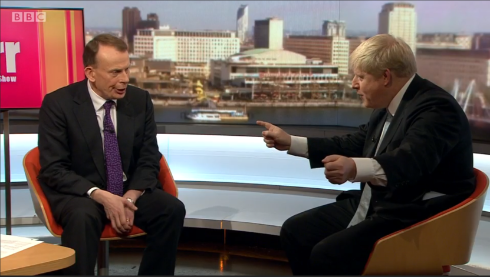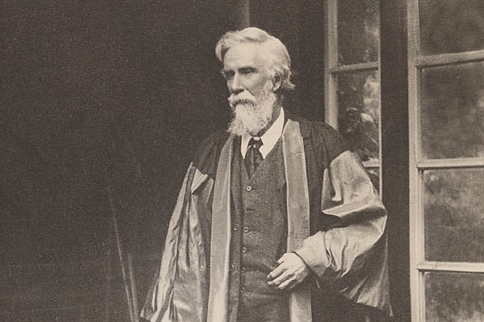Can Jeremy Corbyn be kept off Labour’s leadership ballot?
This is the question in the minds of practically everyone in the Labour party today, as Angela Eagle announces her leadership challenge following MPs’ recent overwhelming vote of no confidence in the leader. The future of Labour politics and, in the short term, of British politics as a whole may rest on this technical—and ultimately legal—question.
My answer is yes, he can lawfully be kept off the ballot paper that goes out to Labour members—even though the rules framework as it stands entitles him to take part in the contest. I’d better explain.
What Labour’s rule book says
The first thing we need to do is look at Labour’s rule book. Here’s a fully up-to-date, 2016 version. Click at the bottom left if you want to see it in full screen view.
The key provisions are in Chapter 4, Clause II; and we’re particularly interested in Clause II(2)(B), which deals with the nomination stage of the process. It says
B. Nomination
i. In the case of a vacancy for leader or deputy leader, each nomination must be supported by 15 per cent of the combined Commons members of the PLP and members of the EPLP. Nominations not attaining this threshold shall be null and void.
ii. Where there is no vacancy, nominations may be sought by potential challengers each year prior to the annual session of Party conference. In this case any nomination must be supported by 20 per cent of the combined Commons members of the PLP and members of the EPLP. Nominations not attaining this threshold shall be null and void.
On the face of it, it seems clear that the rules make provision for two very different situations: first, where there’s a vacancy for the leadership and second, where there’s not. There’s quite often a vacancy for the Labour leadership, the last time being when Ed Miliband resigned. We are now, though, in the second situation because Jeremy Corbyn has very much not resigned. So the relevant provision is Clause II(2)(B)(ii). By the way, the convoluted and unsatisfactory nature of these rules will I think underline the point that legislation, drafted by professional legal drafters, is in comparison clear and concise.
In my view, Clause II(2)(B)(ii) can only be read as requiring that challengers are required to be nominated by 20% of MPs and MEPs, but that the incumbent leader being challenged does not.
Mark Henderson’s advice
This is also the conclusion reach by Mark Henderson of Doughty Street Chambers, whose advice you can read below (with the odd top or bottom of a page missed in photocopying).
If you’re seriously interested in this question you simply must read Mark Henderson’s advice, which deals with the question of interpretation of these rules in much more depth than I am able to here. His advice is very thorough and well reasoned, looking in detail at the approach the courts are likely to take to a contract such as this—and the rule book is indeed in law a contract between the members of an unincorporated association called the Labour party. I agree with Mark Henderson.
I’ll now turn to some of the arguments people are making in opposition to my view and Mark Henderson’s.
Inconsistent drafting
It’s quite true that the rules are badly drafted and include some apparent inconsistencies. For instance, clause II(B)(v) says
v. Valid nominations shall be printed in the final agenda for Party conference, together with the names of the nominating organisations and Commons members of the PLP supporting the nominations
which some people will contend means that all the candidates including the incumbent must be “nominees” meeting the 20% threshold—otherwise the incumbent’s name would not be printed in the conference agenda. And clause II(C)(x) which says
x. The votes cast for each nominee shall be recorded and published in a form to be determined by the NEC as soon as possible following any election
can also be argued to suggest that all the candidates must be nominees, otherwise no one could vote for the incumbent.
But there are problems with these arguments. As far as clause II(C)(x) is concerned, the word “nominee” is used only once in clause II(C), while the word “candidate” is used three times. “Nominee” can only be a drafting error when “candidate” was intended.
By the way, we know there are simple drafting boo-boos since clause II(B)(v) still refers only to “Commons members of the PLP” rather than reflecting the change to include MEPs. I don’t think anyone would seriously try to argue that this means only MPs’ nominations count towards the threshold, in spite of the clear wording of clause II(2)(B)(ii).
More importantly—and this deals with both clause II(B)(v) and clause II(C)(x)—there is no reason to think the incumbent is not and will not be a “nominee” even without having to reach the 20% threshold. It is only potential challengers who have to reach the 20% threshold under clause II(2)(B)(ii).
Other arguments that Corbyn must meet some threshold
I’ve heard three arguments in favour of a reading requiring Corbyn to reach some “nomination threshold” of either 15% or 20%. I want to quickly deal with them before turning to what I think the actual solution is.
The “Kinnock precedent”
The last time anyone challenged an incumbent leader when there was no vacancy was in 1988, when Tony Benn challenged Neil Kinnock, a futile challenge most in the Labour party thought an unwelcome irritant that the rules should never have been permitted. Some say that, because Kinnock needed nominations then, that’s a significant “precedent”, and that we must therefore read the rules now as requiring Corbyn, too, to reach a certain threshold.
The big difficulty with this argument is that 1988 has no precedent value whatever given that the rules have been changed since then. In 1988, the rules made no distinction between the “vacancy” and “no vacancy” situations, and the changes made since have clearly all been intended to make challenging an incumbent much harder. That’s not just the increase of the threshold to 20% (it was just 5% when Tony Benn challenged) but the insertion of the words “by potential challengers” in 2010. To use 1988 as a “precedent” is like trying to argue that MPs alone should take vote in the leadership election because that was what happened when Michael Foot won in 1980. It just doesn’t work.
The “vacancy argument”
Some have argued that in the current situation there is actually a vacancy, either because of the no-confidence vote or because the mere fact of a challenge creates a vacancy. Neither argument works.
If the mere fact of a challenge in itself created a vacancy, then you’d have the bizarre situation where Angela Eagle began needing 20% but then suddenly needed only 15% instead, under clause II(2)(B)(i), either the moment she announced her challenge or when she’d already got 20%. There would never be a “no vacancy” situation and clauseII(2)(B)(ii) would have no meaning. This is obviously wrong.
Nor does the no-confidence vote in itself create a vacancy. Clause II(2)(E)(v) explains what’s meant by a vacancy situation:
E. Procedure in a vacancy …
iv. When the Party is in opposition and the Party leader, for whatever reason, becomes permanently unavailable, the deputy leader shall automatically become Party leader on a pro-tem basis. The NEC shall decide whether to hold an immediate ballot as provided under E above or to elect a new leader at the next annual session of Party conference.
Jeremy Corbyn may be out to a vegetarian lunch but he’s not “permanently unavailable” and Tom Watson is not acting leader. We must conclude that there is no vacancy.
David Allen Green’s “timing only” argument
The most ingenious and best argument I’ve read against my view is (perhaps unsurprisingly) from David Allen Green:
@carlgardner Thought: first sentence of 2Bii goes only to timing fro challengers. Second sentence applies each candidate, including leader.
— David Allen Green (@DavidAllenGreen) July 10, 2016
@carlgardner If so “any
nomination” is not limited to the challenger nominations in the preceding sentence.— David Allen Green (@DavidAllenGreen) July 10, 2016
This approach reads the two sentences
Where there is no vacancy, nominations may be sought by potential challengers each year prior to the annual session of Party conference
and
In this case any nomination must be supported by 20 per cent
as doing different things, the first only imposing a nomination time limit on potential challengers while the second applies to all nominations “in this case” of no vacancy.
It’s a clever argument but I don’t think it works. Why would a time limit be imposed only on potential challengers but not on the incumbent, if he needs a certain number of nominations too? If that were right, what would trigger the incumbent’s need to reach the threshold? A potential challenger reaching it first? In that case, the incumbent might have no time to gather nominations, or might have to do so at the drop of a hat. The mere announcement of a challenge? In that case, if neither a challenger nor the incumbent achieved the threshold, Labour would have no leader. I don’t think this reading of the rules is sustainable, and Mark Henderson takes a similar view.
David has set out his thoughts here. I disagree with his reading of the rules but I agree with him on three key points: that the rules are badly drafted; that it’s open to the NEC to fill any gaps; and that any challenge by Corbyn to a well-drafted and thought-through decision by the NEC to insist on equal requirements for all candidates is unlikely to succeed. The courts will indeed be slow to intervene—but only if the NEC’s own solution does not contradict the written rules.
How to ensure that Corbyn too must obtain nominations
I can now finally turn to how the NEC can solve this. One possible option is for the interpretative question to be referred to the NEC for a conclusive ruling; but the better route is for the NEC to actually vary the rules for the contest.
A conclusive ruling from the NEC
Chapter 1 clause X(5) of the rule book provides as follows:
5. For the avoidance of any doubt, any dispute as to the meaning, interpretation or general application of the constitution, standing orders and rules of the Party or any unit of the Party shall be referred to the NEC for determination, and the decision of the NEC thereupon shall be final and conclusive for all purposes. The decision of the NEC subject to any modification by Party conference as to the meaning and effect of any rule or any part of this constitution and rules shall be final.
One option, then, is for this dispute about the meaning of the rules somehow to be referred to the NEC, which could then decide that Corbyn needs to reach the 20% threshold. On the face of it, that decision would be the end of it, since the rules say it’d be “final and conclusive”. But two things worry me about this option.
First, what constitutes a “dispute”, and who has the power to refer? I’m not sure an argument on the internet or between two members in a pub is enough. Would some constituent part of the party (a constituency Labour party, say, or an affiliated trade union) need to be in dispute with another? Chapter 1 clause VIII(4) may suggest so. And who makes the referral decision? Can either refer unilaterally? This is important because if the referral were procedurally flawed, the subsequent decision might be ruled invalid by a court, and so not “final and conclusive” at all.
Even if the procedure is impeccable, if a court held that the NEC’s ruling was a perverse one, interpreting the rules unreasonably and contrary to their true meaning, it might well decide it was not a proper “decision” at all, and so, again, not “final and conclusive”. Public lawyers will immediately recognise this as Anisminic-style reasoning. I think variation is the safer, more sustainable option.
An NEC variation of the rules
The rules about leadership elections are all contained in Chapter 4, clause II, which begins in the following way:
Clause II.
Procedural rules for elections for national officers of the Party1. General
A. The following procedures provide a rules framework which, unless varied by the consent of the NEC, shall be followed when conducting elections for Party officers.
It’s clear from this that the current rules as laid down in clause II do not automatically apply. They need not be followed if the NEC agrees to vary them. This, in my view, is how the NEC can best resolve things.
The NEC might say that the Labour party finds itself in an unprecedented situation following the overwhelming vote of no confidence in the leader. The rules make no provision for this situation, there is dispute about how the rules should apply and the NEC thinks them unsatisfactory for the purpose. There’s a danger that the procedures could become mired in court proceedings, something no member would want. Therefore, the NEC could say that it’s decided to vary the rules to ensure a fair, transparent, reasonable procedure that is secure from challenge.
The NEC could vary the procedure however it liked, so long as it was reasonable. The big question (assuming it wanted to require the no-confidenced incumbent to seek nominations) is whether the NEC would think it reasonable to treat the post-no confidence situation as akin to a vacancy; or whether it’d see the current situation as more like a “no vacancy” challenge.
If the NEC decided it was right to treat this situation like a vacancy, it might require Corbyn (or all nominees) to obtain a 15% nomination threshold—by my reckoning, 38 MPs and MEPs out of the 230 current Labour MPs and 20 MEPs. This would enable the NEC to say it had retained either the lower threshold for the incumbent leader or even a lower threshold for him as compared with challengers. It is of course more likely that Jeremy Corbyn would obtain 38 nominations than any higher number.
Alternatively, the NEC might decide the no-confidence vote means this is a special, unforeseen and unprovided for variant of a “no vacancy” situation, and that the leader and his challengers should be treated equally. That would require both them and him to reach a 20% nomination threshold—by my reckoning, 50 MPs and MEPs. It’d be harder for Jeremy Corbyn to satisfy this.
True, this route does involve the question of who can seek the NECs “consent” to the variation. It isn’t 100% procedurally safe. But there’s no more procedural risk than’s involved in a referral for an NEC decision, and variation is legally safer. Anisminic reasoning can’t touch it because a variation would not be predicated on an unreasonable or questionable interpretation of the rule book.
Conclusion
I don’t think Labour’s existing rules framework can reasonably be read so as to exclude Jeremy Corbyn from the coming leadership ballot of members. I agree with Mark Henderson. There is a real danger that trying to do so based on the existing rules framework set out in Chapter 4 clause II could be successfully challenged in court.
But the rule book gives the NEC power to vary that rules framework, and it would in my view be reasonable for it to do so in this unforeseen, unprovided for and disputed situation. If it does vary the rules to require the no-confidence incumbent to reach the same nomination threshold as his challengers, I doubt the courts would intervene.


 Since I wrote about
Since I wrote about  As we await David Cameron’s sovereignty plan this week, it might help to explain what we mean by “Parliamentary sovereignty”.
As we await David Cameron’s sovereignty plan this week, it might help to explain what we mean by “Parliamentary sovereignty”.